Singtel will further decentralise its organisational structure by allowing its Australian subsidiary Optus to directly oversee the Optus enterprise division, effective next month.
This will give the Australian subsidiary more operational autonomy and direct accountability.
SingTel Group CEO, Yuen Kuan Moon, said that the company has been evolving its operating model since a “strategic reset a year ago” in order to stay relevant and “maximise shareholder returns, and this is another step in that direction”.
Optus CEO Kelly Bayer Rosmarin added that the change “is about delivering better outcomes for all our customers, whether they are consumers, small business, enterprise customers or wholesale customers”.
She said that with a more unified and collaborative approach across Optus, the company would be able to better meet the localised needs of its business customers and “bring solutions to market more quickly”.
“Importantly, we will still be able to leverage the insights and global reach of Singtel, while having the autonomy to make decisions quickly,” Bayer Rosmarin said.
Optus' enterprise business revenue was A$1.21 billion in the financial year ended March 2022.
NCS decentralisation
Singtel's move to decentralise its organisational structure first started last year when NCS was spun out of its enterprise business and recast as an Asian business-to-business (B2B) digital services organisation.
According to Singtel, the move has facilitated the transformation of NCS as well as helped in its regional growth.
NCS has since expanded into Australia, a market that Singtel considers key to strategic growth.
It has also diversified from its public sector client base and has seen digital revenues jump to almost half of overall revenue in the last financial year.
“With NCS scaling its business in Australia, we expect the combined synergies and capabilities of NCS and Optus to be mutually beneficial as both companies respond more easily to the specific needs of that market,” Yuen said.
He added that Singtel, by adopting a decentralised OpCo-driven structure, “can empower our businesses to exploit commercial synergies and capabilities to drive growth”.
This, Yuen said, is all the more important in “today’s volatile macro-economic environment where business units need greater independence and agility to better navigate the market”.
Talking about Optus, Yuen said the company has been part of the Singtel stable for two decades and is a “leading player in the Australian consumer market”.
“Given the hyper digitalisation that enterprises are currently experiencing, this (decentralisation) is also timely as Optus can focus on advancing its growth as a B2B player,” Yuen added.









